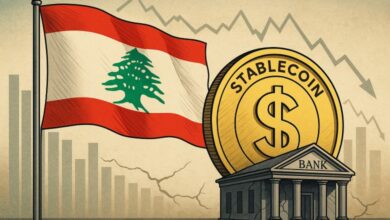The Decline of the US Dollar? Global Economic Trends and the Rise of Cryptocurrencies

Although the US dollar has long been the dominant global currency, its share in global central bank reserves has been decreasing steadily, from approximately 70% two decades ago to less than 60% currently. This decline shows no signs of stopping.
The recent abandoning of the U.S. dollar by powerful nations has accelerated the weakening performance of U.S. assets. Former Assistant Treasury Secretary, Monica Crowley, recently asserted that the fiscal policies of President Biden have jeopardized America’s economic power and its global reserve currency status. She argued that global economic trends are causing a “perfect storm,” which could lead to the “end of the U.S. dollar.”
The launch of FedNow and Saudi Arabia’s potential move
Besides that, the Federal Reserve has announced the launch of its instant payment system, FedNow, in July of this year. This week, it starts to roll out the first stages of the digital U.S. dollar, which will perceptibly bring about more control and scrutiny. In unison, Saudi Arabia is also considering pricing its oil in currencies other than the U.S. dollar. So, where is the US dollar heading? Is this really the beginning of the end?
The significance of dollar pricing for oil and its alternatives is an issue that has not been given much thought since the “petrodollar” agreements of the mid-1970s. However, with Russia already moving away from dollar pricing and relations between Washington and Riyadh strained, it is worth examining who would benefit or suffer if the U.S. dollar is ceased to be the automatic medium for oil exchange.
Russia and Iran’s efforts in de-dollarization
The U.S. and its western allies have slapped massive sanctions on Russia, especially after its invasion of Ukraine, freezing $300 billion in Russian financial reserves and expelling selected Russian banks from the international financial-messaging system (SWIFT). This move has crushed trade between Russia and the U.S. and has pushed Russia to search for an alternative to the dollar in pricing its oil and natural gas.
It is worth noting that Russia and Iran have been making efforts to reduce their dependence on the US dollar in recent months. They have intensified their “de-dollarization” push by collaborating on a gold-backed cryptocurrency that could rival the dominant US dollar.
The two sanction-hit nations intend to increase their trade volume to $10 billion per year through various measures, including developing an alternative international payments system to SWIFT. If Russia legalizes cryptocurrency in cross-border trade, the stablecoin could replace the U.S. dollar as the preferred payment method.
According to CoinDesk, Pavel Zavalny, head of the Russian State Duma’s Committee on Energy, asserted that Russia has been proposing to China for a while now that they switch to using national currencies like rubles and yuan for their settlements. Similarly, for Turkey, they plan to use lira and rubles, and the set of currencies can vary.
The Russian official stated that if they have Bitcoins, they will trade Bitcoins as well. Although this remark appears to be more of an off-hand comment than an official policy statement, it signifies that Russia is aware of the ongoing debate surrounding cryptocurrencies as a tool to bypass sanctions. While it is uncertain whether powerful oligarchs are using cryptocurrencies for this purpose, it is on their minds.
China’s economic strategy: Petro-Yuan and reduced U.S. treasury bond holdings
China is also advocating for the yuan to take the place of the dollar in oil deals with other countries in Asia, Africa, and Latin America. China has urged Saudi Arabia to adopt yuan as the pricing currency for their oil sales, given that it is the destination for more than a quarter of the country’s oil exports. Pricing the kingdom’s oil sales in yuan, would significantly strengthen the position of China’s currency and dent the dollar’s reserve currency status.
Remarkably, last week, China and France settled a liquid natural gas trade in yuan for the first time. This push for the “Petro-yuan” could extend its influence across Asia for crude transactions. China also took steps to bypass Swift, like the creation of a Cross-Border Interbank Payments System (Cips).
From another side, China has been reducing its holdings of U.S. Treasury bonds which recently fell to a 14-year low of $859 billion. This is obviously not a coincidence, but rather a thoughtful policy decision. China is attempting to reduce its investments in U.S. Treasuries and diversify its portfolio in order to reduce its dependence on the U.S. dollar while indorsing the use of the yuan in international trade.
China and other countries are distancing themselves from the U.S. dollar as a global reserve currency, partially due to the inflation problems caused by Biden’s policies and the Federal Reserve’s irresponsible monetary policy. These factors have led to a decrease in the value of U.S. government bonds and increased financial instability, as evidenced by recent bank failures. Additionally, the U.S. government has misused the privilege of the dollar being the world’s reserve currency by utilizing it as a financial weapon against countries like Russia. This is another significant reason for the shift away from the U.S. dollar.
To put it differently, the freezing of Russian assets by Biden’s administration has caused other nations to reconsider their reserve holdings. Nevertheless, the question that arises is: if the U.S. government can freeze your assets anytime, then do you really own them?
An opportunity for Bitcoin to prosper
As Russia and China seek to weaken the US dollar’s position as the global financial anchor, the changing international financial landscape may provide an opening for cryptocurrencies like Bitcoin to become more prominent.
Bitcoin’s decentralized and borderless nature presents an attractive alternative for nations seeking to reduce their dependence on the US dollar and to bypass traditional financial networks.
In recent years, Bitcoin has been utilized by nations experiencing currency crises or economic sanctions to bypass restrictions and maintain their purchasing power.
As a matter of fact, Bitcoin has been used as an alternative means of support during recent protests in Nigeria, when the government attempted to restrict access to funds. Similarly, in Venezuela, where hyperinflation has been rampant, people have used Bitcoin as a store of value.
Recent events in March have brought to light the inadequacies of the Federal Reserve and banking system in managing currency value and asset protection, resulting in the collapse of three U.S. banks and Credit Suisse. Within two weeks, the Fed has printed back two-thirds of the balance sheet reduction achieved in the last year. These events have put Bitcoin in a new spotlight, as they are precisely the reasons why it was created in 2008.
According to Michael Novogratz, the founder of crypto financial services company Galaxy Digital Holdings, crypto markets are showing strength this year.
The price of Bitcoin has risen by nearly 72% to reach $28,500 in 2023, marking its strongest quarterly gain in the past two years and outperforming all other major asset classes. This indicates that the world is embracing it as a valuable currency. The growth and resilience of the Bitcoin industry demonstrate that it’s a force to be reckoned with and cannot be stifled.
After news of a reduction in oil supply, Bitcoin began the new week with fluctuations in price. While it remains stuck at a significant historical resistance point, the week closed with somewhat unappealing results.
The question for experts is whether the market will be influenced by oil prices or if BTC will manage to surpass the $30,000 threshold. Despite this uncertainty, the network fundamentals continue to perform well and an expected rebound in Bitcoin’s price would demonstrate the strength of bulls, says analysts.
Sanctions have proven to be an ineffective means for addressing global trade issues. The idea of finding monetary solutions beyond the control of America is gaining traction, especially among developing nations. While the question remains whether Bitcoin is the answer, it is worth noting that at least one developing country, El Salvador, believes so.
Bitcoin, a Threat to the US Dollar
Meanwhile, U.S. regulators perceive Bitcoin as a long-term threat to the dollar’s reserve status, and are aggressively act against it, despite it being a legal asset class for 20% of the US population. This is just a sign that Bitcoin is moving forward in its adoption curve, now being in the so-called “then they fight you” stage, and its popularity is expected to grow despite the current U.S. administration’s hardline stance.
At present, it is indisputable that the U.S. must brace itself for a transition towards a multi-polar currency environment and adapt accordingly. Failure to do so could lead to dire consequences resulting from economic complacency.





